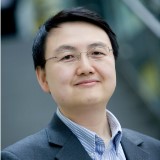Contents
Speaker(s)

Evandro F. Fang
Associate Professor - Department of Clinical Molecular Biology, University of Oslo
Prof. Evandro F. Fang is an Associate Professor of Molecular Gerontology at the University of Oslo (UiO) and the Akershus University Hospital, Norway, and his group are working on the molecular mechanisms of human ageing and age-predisposed neurodegeneration. More specifically, the Fang laboratory is focusing on the molecular mechanisms behind how cells clear their damaged and aged mitochondria, a process termed mitophagy, as well as the roles of the NAD-mitophagy or autophagy axis in healthy ageing and AD inhibition. NAD is a fundamental molecule in life and health and decreases in ageing and AD. Dr Fang is fascinated with and actively engaged in moving his laboratory findings to translational applications and is involved in 5 NAD-based clinical trials, with the overarching goal of establishing novel and safe biological approaches to promote longer and healthier human lives. He has published over 100 papers in international peer-reviewed journals including papers in Cell, Cell Metabolism, Nature Reviews MCB, Nature Neuroscience, Nature Ageing, and Nature Biomedical Engineering. He has received several awards including the Butler-Williams Scholar on Aging 2016 by NIA (USA) and the 'Scientific Award to Young Scientist in the Natural Sciences for 2020 by The Royal Norwegian Society of Sciences and Letters (Norway). After finishing his PhD at the Chinese University of Hong Kong, he had a 6-year postdoc training with Prof. Vilhelm Bohr on molecular gerontology and Prof. Mark Mattson on neuronal resilience in Alzheimer’s disease at the National Institute on Ageing, Baltimore. He opened his lab in Oslo in the fall of 2017. He is the founding (co)coordinator of the Norwegian Centre on Healthy Ageing network (NO-Age, www.noage100.com), the Norwegian National anti-Alzheimer’s disease Network (NO-AD, www.noad100.com), and the Hong Kong-Nordic Research Network.

Sofie Lautrup
Department of Clinical Molecular Biology, University of Oslo and Akershus University Hospital, Lørenskog, Norway
Dr. Sofie Lautrup has a PhD degree in Molecular Biology from Aarhus University, Denmark, where she studied the impact of DNA repair, NAD+ metabolism and compromised mitophagy in ageing and Alzheimer's disease. In her post-doc with Evandro F. Fang, she is studying the underlying mechanisms of ageing in both healthy and pathological ageing as well as in Alzheimer's disease. She is working with both human cell culture and stem cells, the nematode C. elegans, and the fruitfly D. melanogaster.

Linda Partridge
Professorial Research Fellow, Genetics, Evolution & Environment Div of Biosciences, University College London
Prof. Linda Partridge, born in 1950 in Bath, England, studied and graduated in biology at the University of Oxford. After three years of postdoctoral research at the University of York, she was Demonstrator, Lecturer, Reader and finally Professor at the University of Edinburgh. After many years in Scotland, in 1994 she became Professor of Biometry, University College London. She is both a founding director of the new Max Planck Institute for Biology of Ageing in Cologne and Director of the UCL Institute of Healthy Ageing.
Linda Partridge’s research is directed to understanding both how the rate of ageing evolves in nature and the mechanisms by which healthy lifespan can be extended in laboratory model organisms. Her work has focussed in particular on the role of nutrient-sensing pathways, such as the insulin/insulin-like growth factor signalling pathway, and on dietary restriction. Her current work is directed to developing pharmacological treatments that ameliorate the human ageing process to produce a broad-spectrum improvement in health during ageing. She is the recipient of numerous awards, including a DBE for services to science. She is founding director of the new Max Planck Institute for Biology of Ageing in Cologne as well as the Director of the UCL Institute of Healthy Ageing.

Vilhelm Bohr
Affiliate Professor in Genome instability and neurodegeneration, University of Copenhagen
Prof. Vilhelm Bohr , a leading expert in aging and neurodegenerative diseases, has 590+ journal publications. He spent 30 years as Chief of the Laboratory of Molecular Genetics at the National Institute on Aging, part of the NIH. His extensive academic journey includes degrees from the University of Copenhagen and postdoctoral research at Stanford. Throughout his career, Dr. Bohr made significant contributions to understanding DNA repair, oxidative damage response, and mitochondrial dysfunction's role in aging-related neurodegenerative diseases. Though retiring from the NIH, he continues his research at the University of Copenhagen, focusing on the benefits of NR (Nicotinamide Riboside).

Maria G. Spillantini
Professor Clifford Albutt Building Department of Clinical Neurosciences,University of Cambridge
Born in Arezzo (Italy), Prof. Maria Grazia Spillantini, PhD, received a Laurea in Biological Sciences from Florence University and a PhD in Molecular Biology from Cambridge University. In 1996 she moved to the Department of Clinical Neurosciences at Cambridge University, where she was first a Lecturer, then a Reader, and now Professor of Molecular Neurology. Her interest is on tauopathies and alpha-synucleinopathies. With her collaborators, she identified alpha-synuclein as the component of the filaments that form the Lewy bodies in Parkinson’s disease, dementia with Lewy bodies and the glial inclusions in multiple system atrophy and described one of the first mutations in the MAPT gene causing frontotemporal dementia. She has received several awards, including the Potamkin Prize and the Jay Van Andel award for achievements in Parkinson’s disease. She is a Fellow of the Royal Society, the Academy of Medical Sciences, Clare Hall (Cambridge) and Knight Officer of the Star of Italy.

David C. Rubinsztein
Professor & Academician, UK Dementia Research Institute, Cambridge Institute for Medical Research (CIMR), University of Cambridge, Cambridge, UK
Prof. David Rubinsztein is Professor of Molecular Neurogenetics and a UK Dementia Research Institute Group Leader at the University of Cambridge. He is Deputy Director of the Cambridge Institute for Medical Research. Dr. Rubinsztein earned his MB ChB, BSc(Med), and PhD degrees from University of Cape Town. He came to Cambridge in 1993 as a Senior Registrar in genetic pathology. His research is focused in the field of autophagy, particularly in the context of neurodegenerative diseases. His laboratory pioneered the strategy of autophagy upregulation as a possible therapeutic approach in various neurodegenerative diseases, and has identified drugs and novel pathways that may be exploited for this objective. He has made contributions that reveal the relevance of autophagy defects as a disease mechanism and to the basic cell biology of this important catabolic process. Rubinsztein was elected Fellow of the Academy of Medical Sciences (2004), EMBO member (2011), Fellow of the Royal Society (2017) and Member of Academia Europaea (2022). He was awarded the Graham Bull Prize (2007), Thudichum Medal (2017), Roger de Spoelberch prize (2017) and the Goudie Medal (2020). He was identified as a Clarivates Analytics Highly Cited Researcher (2018, 2019, 2020, 2021, 2022).

Nektarios Tavernarakis
Professor of Molecular Systems Biology at the Medical School of the University of Crete, in Heraklion, Greece
Prof. Nektarios Tavernarakis is a distinguished Professor of Molecular Systems Biology at the Medical School of the University of Crete, in Heraklion, Greece. He is also the Chairman of the Board of Directors at the Foundation for Research and Technology-Hellas (FORTH), the largest Research Institution of Greece. He has served as Director of FORTH’s Institute of Molecular Biology and Biotechnology (IMBB), where he is heading the Neurogenetics and Ageing laboratory. He is the Director of the Graduate Program on BioInformatics at the Medical School of the University of Crete. He earned his Ph.D. degree at the University of Crete, and trained as a postdoctoral researcher at Rutgers University in New Jersey, USA. His work focuses on the molecular mechanisms of necrotic cell death and neurodegeneration, the interplay between cellular metabolism and ageing, the mechanisms of sensory transduction and integration by the nervous system, and the development of novel genetic tools for biomedical research.
He is Chairman of the European Institute of Innovation and Technology (EIT) Governing Board and Executive Committee. He has been elected member of the American Association for the Advancement of Science (AAAS), the European Molecular Biology Organization (EMBO), the German National Academy of Sciences (Leopoldina), the European Academy of Sciences and Arts, Academia Europaea, and corresponding member of the Academy of Athens. He has received several notable scientific prizes and awards, including two ERC Advanced Investigator Grants, and an innovation-supporting ERC Proof of Concept Grant.
He is also the recipient of the Alexander von Humboldt Foundation, the Friedrich Wilhelm Bessel research award, the Helmholtz International Fellow Award, the EMBO Young Investigator award, the Galien Scientific Research Award, the BioMedical Research Award of the Academy of Athens, the Bodossaki Foundation Scientific Prize for Medicine and Biology, and the Empeirikeion Foundation Academic Excellence Prize.
Professor Nektarios Tavernarakis is Vice-President of the European Research Council since 01 Jan 2021 and is responsible for the Life Sciences domain.

Richard Siow
Director, Ageing Research at King's Reader in Vascular Biology
Prof. Richard Siow is a graduate of King’s (BSc Nutrition, PhD Cardiovascular Physiology) and following postdoctoral research in the Department of Medicine, University of Cambridge, he joined the School of Cardiovascular and Metabolic Medicine & Sciences at King's as a Lecturer in November 2001. He was previously Vice-Dean (International), Faculty of Life Sciences & Medicine, Faculty Lead for the King's College Service Committee.
Since 2015 he has been the Director of Ageing Research at King’s (ARK), a cross-university consortium of researchers taking a multidisciplinary approach to better understand the mechanisms of ageing, improving health-span and the social and economic impact of ageing.
He is currently a visiting senior academic in the Department of Physiology, Anatomy and Genetics, University of Oxford, Honorary Secretary General of the European Society for Preventive Medicine. and previously a visiting academic in the Healthy Longevity Centre at University of Zurich, Switzerland.

Ole Petter Ottersen
Professor - Division of Anatomy, University of Oslo
Professor Ole Petter Ottersen was the University of Oslo's elected rector for the period 1 August 2009 – 31 July 2017. From 1 August 2017 to 28 February 2023 he served as the President of Karolinska Institutet in Sweden.
1992. He has been head of the Department of Anatomy (1997-1999), Research Dean of the Faculty of Medicine (2000- 2002), Director of one of Norway's Centres of Excellence (Centre for Molecular Biology and Neuroscience, 2002-2009) and from 2009 to 2017 UiO’s rector. In his period as rector, he has led the Norwegian Association of Higher Education Institutions (2013- 2015) and NUS- Det nordiske universitetssamarbetet (2013-2015). Ottersen has led one of UiO’s interdisciplinary initiatives (EMBIO; now UiO:Life Science) and one of the major national programs (Functional Genomics in Norway) of the Norwegian Research Council. He has coordinated two projects under the EU Framework Programme. Ottersen coordinated one of the first three Nordic Centres of Excellence in Molecular Medicine, funded by NordForsk. From 2006 to 2009 he was Chief Editor of Neuroscience - the official journal of the international brain research organization (IBRO).

Geir Selbaek
Adjunct Professor - Department of Geriatric Medicine, University of Oslo
Prof. Geir Selbæk is an old age psychiatrist. He received his PhD at the University of Oslo in 2008. His PhD project focused on behavioural and psychological symptoms of dementia and psychotropic drug use in Norwegian nursing homes. At present, he works as research director at the Norwegian National Centre for Ageing and Health and as professor in geriatric medicine at the University of Oslo. His main research focus is on the epidemiology of aging, risk assessment and diagnostic practice.

Lynne Cox
Associate Professor, Ageing and cell senescence, University of Oxford
Prof. Lynne Cox, a biochemist at the University of Oxford, studies aging in human cells and model organisms, focusing on senescence and Werner syndrome. She earned a first-class Natural Sciences degree at Cambridge, did her PhD with Prof Ron Laskey, and post-doc work with Prof Sir David Lane in Dundee, leading to patents and Cyclacel's formation.
Since her move to Oxford in 1996, Cox examines aging through proteomics, functional methods, and screening to combat senescence-related issues, including the SASP. She also works on Werner syndrome and has created organism models with Dr. Robert Saunders and Prof. Alison Woollard, integrating data from molecular biology with animal biology.
Cox is a Trustee of the British Society for Research on Ageing, Fellow and Tutor at Oriel College, Oxford, Fellow of the Royal Society of Biology, and co-founder of the Oxford Ageing Network, OxAgeN, with Katja Simon. In 2014, she received the Glenn Foundation award for aging research at the House of Lords.

Jon Storm-Mathisen
Professor (emeritus), Div Anatomy, Dep Molecular Medicine, Inst Basic Medical Sciences, University of Oslo, Norway
Prof. Jon Storm-Mathisen is a highly cited Norwegian neuroscientist known for his work on the morphology and immunocytochemistry of the central nervous system. He is a professor of medicine at the Department of Anatomy at the University of Oslo.
Prof. Storm-Mathiesen completed his examen artium at Oslo Cathedral School in 1959, graduated from the University of Oslo in 1965, and qualified as doctor of medicine from the same university in 1976. He is a member of the Norwegian Academy of Science and Letters.

Erik Borge Skei
Division director at Akershus University Hospital HF, Norway
Prof. Erik Borge Skei is the Director of the medical division at Akershus University hospital in Norway since 2019, which consists of 17 departments including geriatrics. He was previously the clinical director at the Children- and youth clinic at Ahus. He is a medical doctor with specialties in pediatrics and children’s diseases. Erik Borge Skei also has a history in Norwegian politicies as the former deputy chairman of the Oslo Left party, chairman and deputy chairmen of different departments in the Oslo municipality.

Katina Handeland
Director of Research & Development, Human Nutrition hos Aker BioMarine, Oslo, Norway
Dr. Katina Handeland is Director of Research & Development and Human Nutrition at Aker BioMarine in Oslo, Norway. Aker Biomarine is a biotech innovator and Antarctic krill-harvesting company, with the dedication of improving human and planetary health. Handeland is working on both design and follow-up of the pre-clinical and clinical trials for the human health portfolio, studying the biological effects of krill and its benefits. Katina Handeland holds a Ph.D. in Nutrition from the University of Bergen, and she has extensive experience with innovation projects for medical nutrition and is currently serving as the President of the Board for the Norwegian Nutrition Society.








